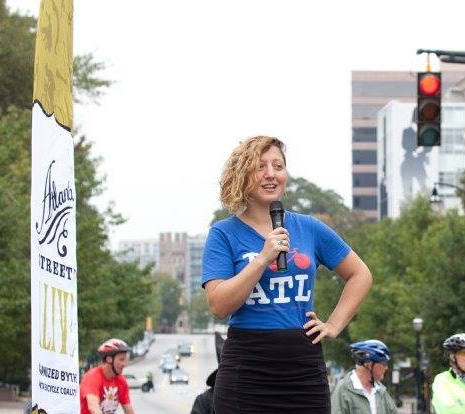
Photo: Becky-Head-Shot
America’s first bicycle officer announces bike share programme for Atlanta
05 April 2016
by Steve Hoare
The first chief bicycle officer to be appointed in the US, Becky Katz, is six months into her job and is preparing to launch Atlanta’s bike share scheme as well as an important extension of the city’s bicycle lanes.
The city has engaged private operator Cycle Hop to run the bike share scheme. Katz has given them licences for 10 stops around the city and is planning another 50 or 60 stations to park 500 rentable cycles.
“The bike share system will be transformative, a real game-changer in terms of attitude and availability of biking,” said Katz.
Atlanta has one of the world’s worst bicycle fatality rates with 9.7 deaths per 100,000 residents, compared with Tokyo’s 1.3 per 100,000, and Katz was recruited last October to coordinate all bicycle projects.
“Infrastructure is a huge element of creating safer streets,” said Katz. “If you increase the number of people who ride on the streets, you will have a safer environment, but to do that you need an improved infrastructure and slower speeds.”
In 2012, Kasim Reed, Mayor of Atlanta, announced the city’s intention to double the number of cycle lanes from 96 kilometres to 193 kilometres. By the end of 2015, Atlanta was up to 129 kilometres and Katz says the city has added another five streets since then including on some of Atlanta’s busiest highways.
Part of Katz’s job specification is to make sure that projects funded by Atlanta’s US$250 million infrastructure bond include a cycling element.
“The focus needs to be on traffic calming, reduction of speeding, enforcement of no parking in bike facilities, enforcement of the three-foot passing law, awareness of what it’s like to ride on the street and reducing distracted driving,” says Katz.
Georgia has a state law that says all vehicles should give cyclists a three-foot gap but it is not widely known about or enforced. Katz is working with the police to raise awareness of it. Another initiative involved bike safety classes with not-for-profit organisation Georgia Bikes.
“Many of our projects that include better bike infrastructure also increase pedestrian safety,” says Katz. “Sometimes, bike and pedestrian safety are looked at in opposition to traffic. But we like to think of them in tandem. When you elevate safety you get a better environment for all users. Fewer accidents means less congestion and less congestion means you are less stressed and happier when you get home from work.”
While Katz has received a lot of media attention as America’s first chief bicycle officer, she acknowledges the influence of former Director of the Boston Bike Program Nicole Freedman, who gave a well-received speech in Atlanta several years ago. Katz says she has heard from other cities, which are keen to appoint a chief bicycle officer but for now, she believes, her job title remains unique.













